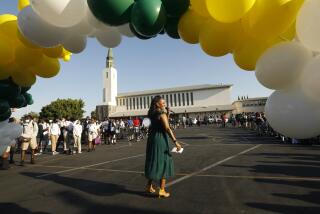Catholicism’s Sway in Quebec Falls Further
- Share via
MONTREAL — The bishops who reigned supreme in Quebec for more than a century would wince. These days church pews are rarely filled, and more couples in this province live together unmarried than anywhere else in Canada.
The Roman Catholic Church, once the rock on which French Canadians built their identity, now plays a radically diminished role in Quebec society.
Although nearly all of the province’s
6 million French speakers have Catholic roots, fewer than 10% attend Mass regularly, compared with 90% a few decades ago. Once-
pervasive church influence over politics and culture has faded almost totally.
Over the coming months, Quebec will be taking a major step that underscores the church’s declining influence. With broad popular support, the provincial government is converting the public education system from one managed by Catholic and Protestant school boards to one run by French- and English-language boards.
Quebec’s legislature voted unanimously to make the switch. The proposal won easy approval in the federal House of Commons in November, and approval by the Senate is expected this month.
Quebec’s church-based school system is not the only one facing change. Newfoundland is also trying to eliminate religiously controlled schools despite opposition from Catholic and Pentecostal leaders.
Ironically, a Catholic public school system remains intact in Ontario, long viewed by Quebec residents as the bastion of English-speaking Protestant power. The federal constitution established publicly financed Catholic and Protestant systems in Ontario, but the Protestant system evolved into a secular one.
The churches have not run Quebec’s public schools since the 1960s. School boards are elected from the general community, and religion courses are optional.
“Quebeckers no longer identify themselves as Catholic or Protestant, but as French-speaking or English-speaking,” said Christiane Miville-Deschenes, press attache for Quebec’s education minister.
It is a big comedown for the Catholic Church, which founded Quebec’s school system and for decades controlled education, teacher training, welfare and health care.
At the peak of its influence from the 1930s to ‘50s, the Catholic Church enjoyed “a power and presence with few historical parallels in a largely industrialized society,” Gregory Baum, a religious studies professor at Montreal’s McGill University, says in “The Church in Quebec.”
The church dominated people’s lives from conception to death and was closely intertwined with the political leadership.
“It controlled cultural and intellectual life right down to what kind of books could be published, what sort of paintings and sculpture exhibited, what kind of plays performed,” wrote Stephen Clarkson and Christina McCall, biographers of Quebec-born former Prime Minister Pierre Trudeau.
*
Today, Quebec’s government is staunchly secular. Montreal has a lively sex industry. And Catholic officials are debating whether they can afford the upkeep of many of the little-used churches that tower over virtually every town in the province.
Catholicism once helped French speakers distinguish themselves from other Canadians, but church opposition to divorce, birth control and premarital sex now has less influence. Government statistics show that 24% of Quebec families are headed by unmarried couples, nearly twice the national average.
The church has accepted its reduced status stoically but hopes for a rebirth, in dedication if not in numbers. There is more social activism, more focus on serving the needy.
John Walsh, a priest and Montreal radio talk show host, said the church now sees itself as just one element in Quebec’s multicultural society and is trying to shed its patriarchal ways.
Catholic leaders generally have stayed out of the debate over changing the school system. The most vocal opposition has come from English-speaking organizations that fear an erosion of the rights of linguistic minorities.
The Quebec government wants the new system in place for the 1998-99 school year.
Under the new system, all public schools would offer a choice of classes in Catholicism, Protestantism or ethics. The question of whether religion classes should be eliminated from public schools is part of a separate study.
The church’s acquiescence parallels its adaptation to the “quiet revolution” that swept away many of its powers during the 1960s.
A new provincial government came to power in 1960 on a promise to overhaul education, and the church quickly withdrew from teaching and social services.
Even in church-affiliated public schools, religious education became optional. French Canadian culture flourished as writers and artists began to explore nonreligious themes.
More to Read
Sign up for Essential California
The most important California stories and recommendations in your inbox every morning.
You may occasionally receive promotional content from the Los Angeles Times.











